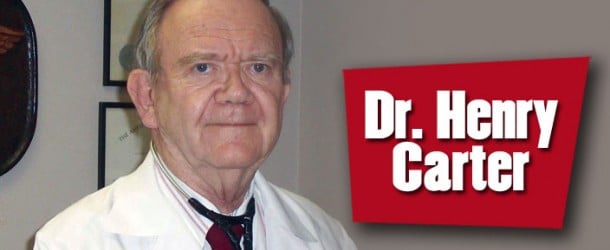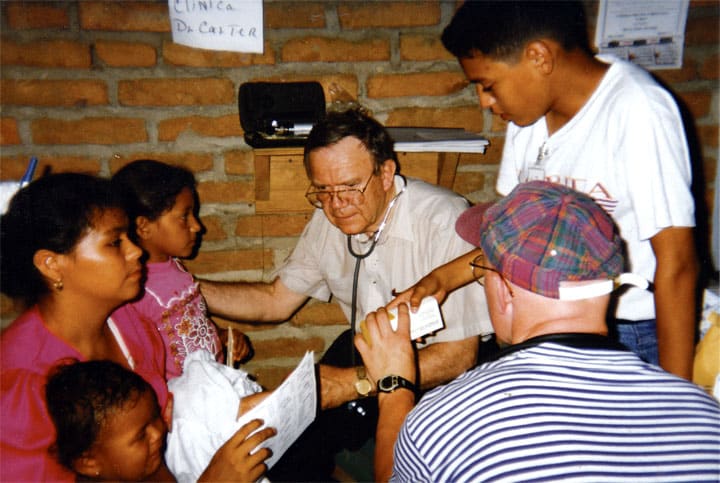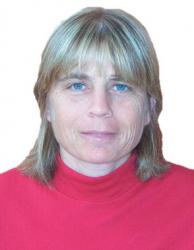DeRidder Physician’s Career Includes Family Medicine Practice, Mission Trips To Honduras, Free Clinic • By Karla Wall
Having just retired last July, Dr. Henry Carter, 85, can look back on a long career of helping others with some justifiable pride, but when he does, he looks back with pride not on his own accomplishments, but on being part of a community effort to help others.
But Carter’s accomplishments are many, and include a long-time family practice in DeRidder, numerous mission trips to aid villagers in remote areas of Honduras, and opening a free clinic for the working underinsured and uninsured.
Carter had served one year of his residency in obstetrics when, in 1954, he joined the Navy. He returned to medicine in 1956, but decided against returning to obstetrics, opting instead for family medicine.
In 1957, on the advice of some medical school friends who lived in the area, he relocated to DeRidder and opened a family practice. He operated his clinic for 20 years before doing a residency in internal medicine at Ocshner Hospital in 1977. He and his wife came back to DeRidder, and in 1981 Carter opened an internal medicine clinic in DeRidder. He took on an associate in 1984, a relationship that would last until 2004.
It was in 1975 that a cousin who had been involved in a mission trip with the organization Baptist Medical And Dental Mission International, based in Mississippi, encouraged Carter to become involved. That year, Carter took his first mission trip to attend to the spiritual and medical needs of people in Honduras in 1984.
It was the beginning of a long list of such mission trips for Carter, who says he’s been on 25 missions, the last one being four years ago.
“I haven’t gone (on mission trips) lately because of health reasons,” he says.
In 1985, Carter became part of a newly formed mission team based in DeRidder, Baptist Medical-Dental Mission of DeRidder. And though he says medical help was a very large part of the missions’ efforts, the primary goal was to attend the spiritual needs of people in the villages visited.
“Our purpose was Christian evangelism,” Carter says. “Attending to health needs was important, but the main impact we wanted to have was on the spiritual lives (of the residents).”
Carter, who was accompanied by his wife on most of his mission trips, says it was quite a culture shock at first.
“There was no hot water; we had to sleep on the floor,” he recalls. “In some instances, the mission site would be a four- to six-hour drive from the airport, and transportation was difficult. It was quite a shock seeing the conditions the villagers were living in. Now, it’s not quite as bad as it was back in, say, 1984. Now most areas have running water and electricity.”
Among the many memories that stand out for Carter was the patience of the people he treated.
“Residents would walk for hours for the services provided by our teams,” says Carter. “They stood in long lines for most of the day. They would register and enter their biographical information, attend a church service, then stand in another long line for medical and dental services, then stand in yet another long line for the pharmacy. From the very old to the very young, people were never impatient or irritable. Young children helped care for young siblings; mothers nursed babies as needed. Our efforts, while sincere and, I believe, truly helpful, seemed scant for the price the nationals paid in fatigue, hunger, thirst and, no doubt, discomfort. But the people were very gracious and grateful. They were a joy to work with.”
Carter says that most of the cases he treated involved nutrition-related problems, as well as asthma and respiratory problems.
“Most villagers cook with an open fire in their homes,” he explains. “That leads to a lot of airborne irritants, and respiratory problems.”
One case that stands out in Carter’s memory, however, involved a young boy who had suffered a snake bite.
“It was late afternoon on the day of our arrival in one of the most remote communities we’d ever visited,” Carter says. “We were setting up the clinic, when a group of people arrived; they had been walking for several hours carrying a stretcher made of a blanket stretched on two poles, and on the stretcher was a preadolescent boy who had been bitten on the foot by a venomous snake. The foot, despite traditional local treatment, was showing significant swelling and discoloration from the venom. No one had mentioned the possibility of needing antivenin, so we had none, nor did we have any other significant treatment to offer.
“We cleaned the wound, gave (the boy) antibiotics and steroids, and put him on a vehicle to a hospital about an hour or so away. Later, we learned that that small hospital didn’t have antivenin, either, and couldn’t give him treatment. They took the boy in a Jeep to Tegucigalpa, another three-hour ride. We were glad to hear later that treatment had been successful, and the boy didn’t lose his foot. We did begin carrying antivenin after that trip. We learned lessons on being prepared on each year’s mission.”
Carter is very quick to emphasize that he was only a small part of a huge, community effort involved in each mission trip.
“There were a lot of people involved in those mission trips,” he says. “There were 35-65 people on each mission team, and a lot of other people getting involved in preparation and team support. There was a support team of about 100 or so people, who provided financial support, medicines — we usually purchased several hundred thousand pills — hundreds of doses of medications. It is a true community effort.”
Carter didn’t confine his efforts on behalf of the less fortunate to remote villages in underdeveloped countries. In 2009, he opened Agape, a free clinic for working or temporarily unemployed and uninsured patients, in DeRidder. Carter still works at the clinic, which is open on Thursdays. The clinic, he says, is available to those whose resources are not greater than 200 percent of the federal poverty level.
Again, Carter emphasizes that the clinic isn’t his achievement alone.
“It’s a true community effort,” he says. “Every worker in the clinic is a volunteer. Volunteers renovated the building before we opened. The building is cleaned by another volunteer group. Another volunteer group provides dinner for the staff. And many in the community provide financial support for expenses such as medications, utilities, insurance. We receive no government funding. We exist on donations, volunteerism and memorial gifts.”
Though those people who have been helped through his efforts, and those who know him beg to differ, Carter says he’s not a hero, just lucky enough to have been part of a huge group effort.
“No one individual can take credit,” he says.

















Comments are closed.